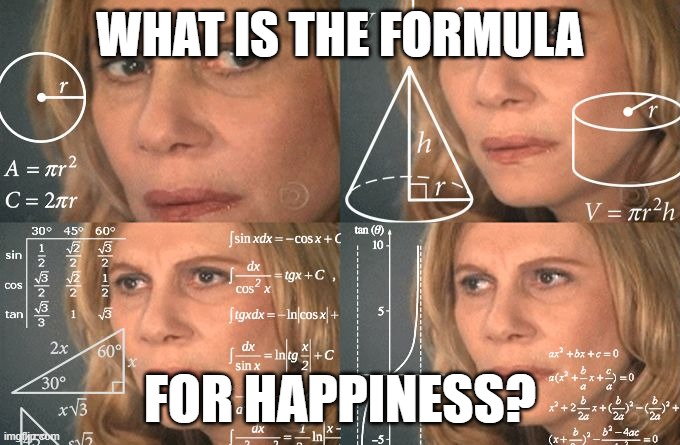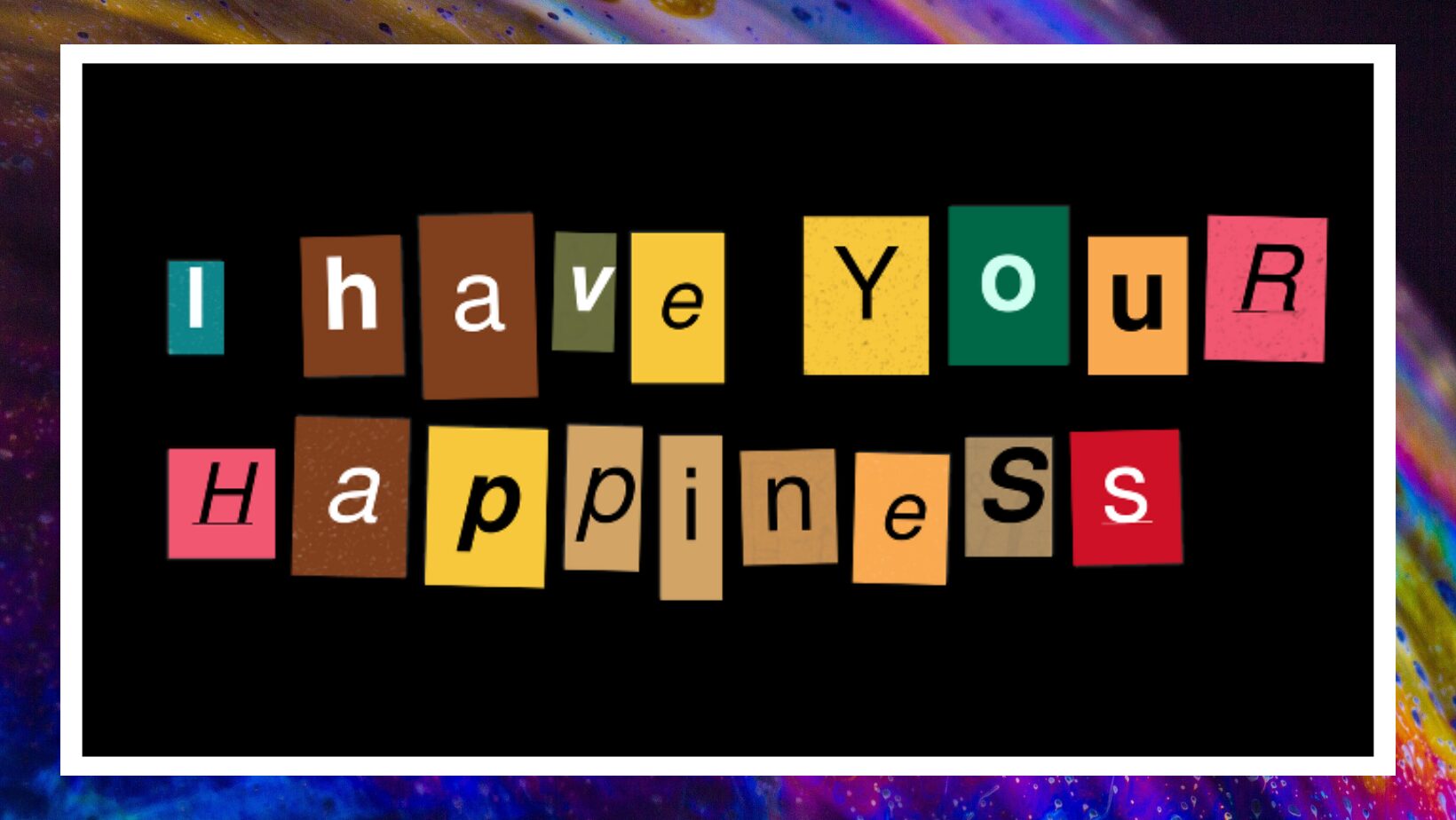Have you ever gotten a ransom note that read like this:
Dear Me,
I have your contentment, joy, and peace.
I will not release them until each of my demands are met. My demands are as follows:
1) The people I care about must be happy
2) I must make more money
3) My body will be better looking
4) I need the perfect lover, career, car, and house.
5) I will be held in high esteem by everyone I meet at all times.
If my demands are not met, you will never see contentment, joy, and peace again.
– Me
This might seem over the top, but we do this with ourselves all the time. This ransom note is a metaphor for how we hold our own happiness hostage. We don’t want to ransom our wellbeing away, but we can’t seem to help it. In a warped mental world, it makes sense to demand of ourselves before we are allowed to be happy.
Before I discovered how happiness really works, I used to make demands of myself too (and still do sometimes):
I demanded what I could not control.
I wanted more and better.
I desired perfection.
I set up impossible goals and withheld happiness until I met them. It sounds insane when I look at it, but my mind did this again and again.
Even if we somehow meet each demand, happiness is short-lived. We feel elated for moments or hours before moving on to new demands.
Do you ransom your happiness?

Have you been chasing an elusive experience of levity? Does it feel like it dissipates the closer you get it? Do you suffer an illusion that happiness is just on the other side of your goals?
It’s like chasing a rainbow. As you close in, it evaporates into nothing. Realize the ways you limit your peace of mind. When you understand how you ransom your innate wellbeing, you can finally stop.
Right Side Up
What if it worked the other way around?
Instead of working to create the right external conditions for happiness, what if you realized that happiness was within you?
Contentment is our core. Each person has an infinite depth of love, creativity, and joy that wells up from within. No exceptions. The only reason we don’t experience it more is because we cover it up. How do we block this inner resource? Through judgement and seeking.
You would never consciously stop yourself from being happy. Yet, you ransom away a joyful experience of life without realizing it. You use your mind in a way that steals inner peace.
Let’s get it back!
I share an understanding that can help you stop all that. No more ransoming. No more withholding. Give yourself permission to live a life of easeful connection and peace. Allow yourself to be happier.
In this article, I will share 2 games we play that keep happiness away and an understanding that brings it back.
Finding natural levity comes through a realization of how happiness actually works. Don’t expect any techniques or seven step methods (It’s those seven steps that keep you from a natural experience of happiness in the first place). Instead, I will share where contentment comes from and what gets in its way.
In happiness, you tend to get what you thought you needed in order to be happy.
The Illusion

The more we believe outside influences determine how we feel, the more the whims of the world have a hold on us. We become controlled, yanked around by life so hard we get mental whiplash.
It seems like contentment comes from external circumstances. If only life was different, problems would go away. Stress oozes around topics like job, kids, spouse, and traffic. Little annoyances blow up into catastrophes. The reason for this has less to do with what happens, and more to do with what we think about what happens.
A change in thought changes our experience. This is why the Subaru that cut us off in traffic seems like a huge deal one moment but doesn’t matter later on. The event didn’t change, our thinking did.
What if happiness wasn’t inherent to life circumstances? It’s not at the end of the goals you set for yourself. Nor is it in an upgraded car, spouse, or house. A spilled cup of coffee doesn’t give you a crappy morning. It is only ever your state of mind.
If you want to stop ransoming your happiness, start to be suspicious. Suspect that life events do not have a cause and effect relationship with wellbeing. I wrote a whole article about the power of distrusting your thinking. A smidge of distrust acts like a magical fairy dust here. It opens the door to life changing realizations. Realize that thought creates reality.
Happy First
If you don’t want to chase it forever, happiness needs to come first.
It needs to come:
before those around you are happy
before you have the perfect body or diet
before you meet the quota at work
before you get the brand new gizmo.
Sounds crazy, right? Even unrealistic. “I can’t be happy until the kids are happy!” If you are to find enjoyment in this life, find it before anything happens. That is where happiness only ever exists, in the present moment.
Happiness seeking is an addiction. We need more and more to create diminishing results. Of course we want to be content in life. Of course we want to avoid suffering. But if we don’t understand where these come from, we will act in ways that block the very thing we seek to find.
If it looks like circumstances determine wellbeing, then it makes sense to do everything possible to manipulate those circumstances.
Manipulating life becomes a full time job. A hyperfocus on circumstance leads to a downward spiral of stress and discontent. We try to predict, change, and control life events. This is a difficult, even impossible job.
I wouldn’t have a problem with this manipulation approach if it actually worked. Examine it. Does it work? We work so hard to align our lives in the best way for wellbeing. We try to have the right morning routine, diet, and goals. Yes, it may seem to work for a while. A big change like a new job or a lottery win produces a temporary bump in happiness. Yet these changes do not create long term life satisfaction. The effects of circumstance dependent happiness are fleeting at best, an artificial lift that does not last.
Once we understand the power of thoughts, we might attempt to control those too. If we can banish the bad thoughts and cultivate positive thoughts, then we will be happy.
I tried everything to become a positive thought machine. This set me up for a roller coaster experience of life. I pushed myself to feel good. I strove to create highs only to drop down into anxiety, depression, and suicidal thoughts. By forcing a better life, I threw myself out of my own balance and rhythms.
Low moods happen. They are like exhaling, a sign that we are alive. When I have perspective, I can flow with the low. When I understand the facts of life, I don’t have to fight to control my thoughts or my mood.
Pain is not in what is. Pain is resistance to what is.
An Untouched Peace
True contentment exists beyond thoughts, circumstances, and events. It is before the stuff of life.
When we are content, it is because we have relaxed into the wholeness of who we really are.
You don’t have to make happiness come first because it already is first. Peace exists when our minds aren’t filled with mental tension. Before we made a whole bunch of rules about when and how we can be happy, happiness was there. Levity is the default human state. Sounds too good to be true? Look at children. With no conditioning about the requirements for happiness, they live joyfully and in the moment.
This is an invulnerable part of ourselves. Nothing can harm, tarnish, or destroy the peace of who we are. This inner peace is untouchable because it is beyond the individual human experience. No trauma, event, challenge, loss, emotion, thought, or experience can touch it. Our inner peace is like a superhero without any weaknesses. Kryptonite is powerless here.
While nothing can harm our inner wellbeing, we can crowd it out of our minds. We block this peace when we believe painful thoughts.
Happiness becomes elusive when life needs to change first.
Happiness Math
We chase our joy with an ever changing set of formulas.

I used to think I needed to figure out a way to be more content. No one else will do it, I thought, so it has to be all on me. I tried yoga, meditation, affirmations, therapy, cold showers, and oh so much more. My mind went on overdrive, obsessed with decoding the secret to unbridled joy.
The intellect thinks happiness is a problem. This analytical mind is a problem solving machine, so it uses this tactic when it comes to wellness. It spins off in a constant search for a formula.
Do you approach your life like a math problem? Instead of solving for X, you attempt to solve for happiness?
While I loved English and Social Studies in school, I struggled with the topic of Math. In college, I had to retake highschool math. I ended up passing those classes and basic college math, but it wasn’t easy for me. A funny t-shirt I used to identify with reads: “Dear Math, solve your own problems.”
“Dear Math, I am not your therapist. Solve your own problems.”
– A funny t-shirt
While not everyone loves math, our minds can’t seem to get enough of Happiness Math.
Happiness Math is when we take our life as it is and add or subtract to equal happiness. The mind loves this game. It creates made up scenarios by adding a new job, more money, or even a yummy dessert. It subtracts a few pounds, that annoying coworker, or the terror of a mother in law.
We play at this all day. The mind chews on problems like a kid chewing on candy. While it might taste good, it rots our mental teeth.
The other end of the equation always holds the promise of contentment. Your present moment plus or minus a few changes equals happiness.
Life + This – That: Happiness
The formula is pure conjecture. It is completely made up! They are a temporary solution, an idea that takes us away from the present moment. Each formula is a judgement of what is here now.
The mind solves for happiness to deny discomfort. Because we don’t like to be in uncomfortable feelings, we create a fantasy of something better. Happiness math is a technique that minds use to avoid a present experience. It may help soothe us now, but this process creates pain, disconnection, and judgment in the long run.
What if we just let ourselves experience the discomfort? We let it flow over us and through us. When we do this, we see how transitory it is. From a distance, it looks scary. The closer we get to it, the more we see how benign it really is. The experience of an uncomfortable moment can be our teacher. It contains lessons that Happiness Math can’t impart.
Happiness Math is a tool of escape. I encourage you to go in the opposite direction. See that there is nothing to escape from. Every challenging experience is a temporary combination of thought and feeling. Both are nothing more than inner energy. When you realize this in a deeper way, you won’t need the formula for happiness. You can be more comfortable in any experience.
I don’t get this perfect every time. You won’t either. Get curious and give it a try. Happiness Math is always there if you think you need it. Notice when your mind starts that game. Examine what happens. Ask yourself, has it ever really given you anything?
The Six Degrees of Happiness

Have you played the Six Degrees of Kevin Bacon?
It is a game based on the idea of six degrees of separation, a theory of human interconnection originally shared in a story by Frigyes Karinthy. The theory states that you can follow a chain of connections back to anyone in the world. Less than six degrees of separation connects each person with any other.
Here is an example of the 6 degrees game that connects Danny Devito to Kevin Bacon:
Danny Devito was in the movie Tin Men -> with Brian Constantini who was in the movie Diner -> with Kevin bacon.
We find a more humorous example in the movie Spaceballs: “I am your father’s, brother’s, nephew’s, cousin’s, former roommate.”
“I am your father’s, brother’s, nephew’s, cousin’s, former roommate.”
– Darth Helmet

The six degrees of separation game also applies to how we approach our happiness. We create a chain of events that need to happen before we can be content. This is happiness math on steroids.
The six degrees of separation game is about connection. When we apply it to happiness, the game disconnects us instead. Instead of connecting us to joy, the chain of events binds us to discontentmentment.
It is hard to be happy when you think our happiness is multiple steps removed from where we are now. When I coach clients, this comes up often. My clients have a long list of “this leads to that.”
I need to get rid of insecurity -> to be a better speaker -> to lead more team meetings -> so I can get a promotion -> become more respected and successful -> so that I can be happy
I need to get rid of my belly fat -> to look better in a swimsuit -> so I can attract others -> to start a relationship -> so I won’t be lonely -> and then I can be happy
This used to be my chain:
I need to meditate and do cold showers -> to have mental clarity and energy at work -> to be a model for my clients -> increase my sales -> and get more money -> so I can be happy
These are long chains toward happiness that include elements of life we don’t control. I’m not saying it is a bad idea to have life goals and aspirations. I am saying that it is a bad idea to tie happiness to them.
As long as we tie our wellbeing to the end of a chain of events, it will drag us down.

When it comes from within, happiness is light as air. Like air, it is all around. When attached to circumstances, it becomes heavy, solid, and unliftable. The chain used to pull what we want towards us becomes a ball and chain attached at our ankle, imprisoning us.
We begin to work toward an end goal. When we complete a link in the chain, we don’t feel any progress toward lasting happiness. The tension between plan and the lack of outcome creates stuckness. The mind realizes how far away it is from its ultimate goal, so it gives up again and again, only to formulate a new plan.
Even if we complete the last step in the chain, we find that happiness isn’t there. We seek a bridge to joy that doesn’t exist.
The insidious part of this is that we don’t realize we placed our wellbeing at the far end of a chain. It looks like we are working toward a goal for its own sake, but happiness is really the expected outcome. We act in life unaware that we have put our happiness on the line. It becomes an invisible motivator. We feel discomfort from a seeking mind, but can’t identify where the pain comes from.
If we believe it exists outside of ourselves, happiness becomes a hidden driver of action.
Happiness Math is a repetitive short term game, tending to be more visible. We hear thoughts that say “If only I had more money.” The Six Degrees of Happiness game tends to run in the background, informing our lives over years of time. This affects us in a profound way. We find ourselves doing something we don’t want because we believe contentment is at the other end of it.
We make big life decisions by following a formula instead of what is in our hearts.
Mid-life crises come from a breakdown in the chain to happiness. Disillusionment and frustration peak when we can’t get what we want with the path we created.
When I create goals without happiness on the line, I work with consistency and determination. In fact, the more I focus on a single part of the chain, the more I create with ease.
I am in the moment. Instead of focusing on the implications of the full project, I complete one step at a time. When I don’t overwhelm myself with conceptualization, I create for the sake of creating. This is mindfulness in action.
Expected outcomes block motivation. Notice if you are holding on to them. Check the goals that drive your actions. Do you have contentment linked to the end of the chain, dragging you down? When connected, you can feel it. Stress, frustration, overwhelm, and lack of motivation let you know when you are in a happiness seeking mode.
You ransom away happiness by playing mental games like Happiness Math and The Six Degrees of Happiness. Notice when your mind starts to play. Feel the craving and longing as the mind judges this moment. These two games might seem important, but they will never feel good. Dissatisfaction is at the root of each game. This feeling is an invitation for you to stop playing and relax back into presence.
Flip the Script
It’s time to flip the script on the demands for happiness. Instead of demanding circumstances in our life be a particular way, find happiness in the moment. See that only a mind that likes to solve problems will make these demands. If it looks like joy is “out there,” the mind will do everything it can to help you retrieve it.
You now know that happiness doesn’t need to be retrieved.
Wellbeing is who you really are, an inner resource you were born with. Contentment, joy, and peace are gifts freely given with no strings attached. You create the strings that yank away your happiness.
I have a door in my house with springs in the hinges. It closes a closet door in my bedroom so my dog, a rambunctious Pit mix, doesn’t steal my socks. I don’t have to remember to shut the door. I let go and the door shuts itself. Many people think that the door to happiness works that way too. They need to hold the door open or it will slam shut in their face.

It works the other way around. The door to your happiness is primed to spring open. There are times that the door can get blocked. When there is a doorstop in the way, it can’t open.
Painful thoughts are that doorstop. Only thoughts that are accepted, unquestioned, and held as true can block the door to you innate joy.
The secret is not to change the thoughts, have less of them, or attempt to control them. True change happens when you hear your thoughts in a new way.
Don’t take your thinking at face value. Listen for a deeper level of understanding to reveal itself. This comes when you don’t take your mind so seriously. Relax your relationship to your thoughts.
Remember, you don’t have to make happiness come first. Happiness is already first. You just have to make sure nothing else cuts in line. When you imbue them with energy, you allow judgement, fear, and discontent to cut the line. You empower these thoughts with attention and focus. Look in a new direction. See them in a new way. Without ignoring, dismiss these painful thoughts as mental noise.
Then, you can come from contentment, joy, and peace. When you come from happiness instead of trying to come to it, magic happens. Discover your renewable resource of innate power.

Are you ransoming away your happiness? What are your demands?
Stop stealing your peace and find joy within.
Resources

My name is Rich Life and this is a Realization Reading. I invite you to take part in a transformative conversation.
If you liked this, learn why you can’t mess up at being human.
Much of my writing is based around the 3 Principles understanding of Sydney Banks, and enlightened Scottish mystic. Learn more about him here. The 3 Principles of Mind, Consciousness, and Thought he discovered helps us to understand the nature of our experience.
Those who explore this understanding find that their lives transform. Read more articles if you would like a richer experience of life. If you would like to connect, let me reach out to you or sign up for my mailing list and get Insights in your Inbox.
Please help me reach more people with the message that the core of who you are is peace, love, and connection. Share this article with someone you care about.
Your vibrant life is a single thought away.


Leave a Reply